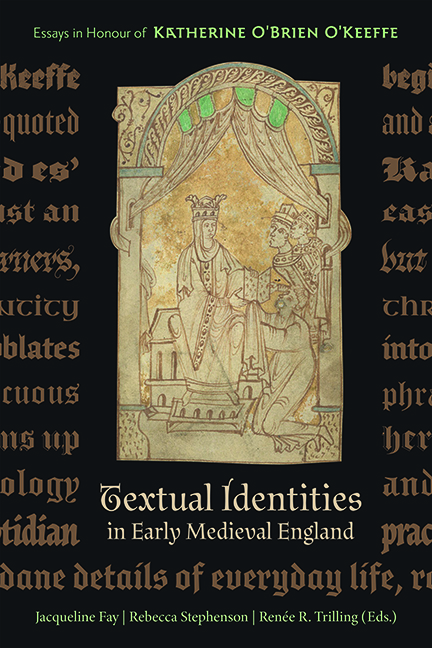Book contents
- Frontmatter
- Contents
- List of Illustrations
- List of Contributors
- Acknowledgments
- List of Abbreviations
- Introduction
- Part One Affect and Embodied Cognition in Medieval Didactic Texts
- Part Two Sovereignty, Power, and English Textual Identities
- Part Three Acts of Public Record in Making and Sustaining Communities
- Overview Of Career
- The Writings of Katherine O’Brien O’Keeffe
- Bibliography
- Index of Manuscripts
- General Index
- Tabula Gratulatoria
- Anglo-Saxon Studies
Introduction
Published online by Cambridge University Press: 26 May 2022
- Frontmatter
- Contents
- List of Illustrations
- List of Contributors
- Acknowledgments
- List of Abbreviations
- Introduction
- Part One Affect and Embodied Cognition in Medieval Didactic Texts
- Part Two Sovereignty, Power, and English Textual Identities
- Part Three Acts of Public Record in Making and Sustaining Communities
- Overview Of Career
- The Writings of Katherine O’Brien O’Keeffe
- Bibliography
- Index of Manuscripts
- General Index
- Tabula Gratulatoria
- Anglo-Saxon Studies
Summary
While the linguistic exercises of the Colloquy show it to be an elementary text for language acquisition, I argue that it had other work to do. ‘Esto quod es’ [Be what you are] is the phrase that shows that work to us; it speaks to the need for forming identity while claiming that identity is always already formed; it shows us the nexus between language learning and naturalization into monastic life; most remarkably, it speaks to anxieties over the will of oblates, whose religious commitments were made by others.
IN WRITING of Ælfric's Colloquy, Katherine O’Brien O’Keeffe begins by analyzing the oft-quoted and apparently straightforward injunction, ‘esto quod es’ [be what you are]. In Katherine's reading, ‘Be what you are’ becomes not just an easy-to-translate phrase for Latin learners, but a command to embrace their new identity through the many different practices that turn oblates into monks. Her focus on a single innocuous phrase becomes a fulcrum that opens up her inquiry to larger questions of epistemology and identity formation, rooted in the quotidian practices of the monastic schoolroom. The mundane details of everyday life, routinely overlooked when we ask big questions, become the foundation for understanding an entire worldview: to use Katherine's phrase, they have other work to do. What ‘esto quod es’ means was never in dispute, but Katherine made us rethink how it means, unpacking one of the simplest phrases in Anglo-Latin literature to reveal a complex site that constitutes monastic identity.
This keen ability to deduce large structures – like identity, agency, subjectivity – from the easily overlooked details of the everyday characterizes all of Katherine O’Brien O’Keeffe's work. Seemingly unremarkable facets of early English culture, from punctuation to formulaic language, become the foundation for a complete reorientation of the material that introduces a mode of investigation that was not previously possible. In other words, Katherine pioneered a methodology that used some of the medievalist’s strongest tools, philology and textual criticism, to reconstruct entire edi-fices of medieval thought. By focusing on minute pedestrian details of composition, for example, we can uncover the assumptions that went (quite literally) without saying for medieval scribes, but are opaque to modern scholars.
- Type
- Chapter
- Information
- Textual Identities in Early Medieval EnglandEssays in Honour of Katherine O'Brien O'Keeffe, pp. 1 - 10Publisher: Boydell & BrewerPrint publication year: 2022

